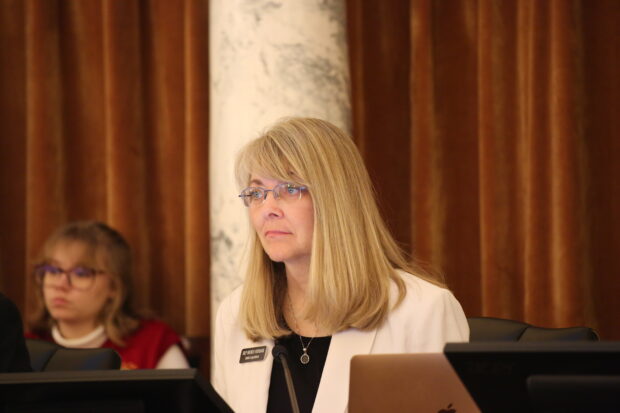Another major school choice bill has failed in the Idaho Legislature.
The House Revenue and Taxation Committee narrowly rejected House Bill 447, which would have created a $50 million tax credit and grant program to subsidize private school tuition. The split vote marked the latest chapter in Idaho’s debate over school choice, a loose heading of proposals directing taxpayer funds to private education in the form of tax credits, education savings accounts or school vouchers.
A bipartisan group defeated the bill after an emotional hearing, which unfolded in a meeting room packed with school choice supporters.
Opponents feared the tax credit’s costs would balloon, as has happened in other states, and that the taxpayer funds wouldn’t be accountable in private schooling. Spending $50 million on top of House Bill 521’s income tax cut and $1 billion appropriation to public schools “is not being fiscally responsible,” said Rep. Jon Weber, R-Rexburg.
Rep. Wendy Horman, R-Idaho Falls, and Sen. Lori Den Hartog, R-Meridian, sponsored the latest school choice proposal, after years of failed attempts to pass a voucher or education savings account program.

“The reason I was talked into running for office in the first place is I care about the education of every single child no matter where they learn,” Horman said.
HB 447 would have allowed private school families of any income to claim $5,000 tax credits for tuition, fees, transportation, tutoring and other expenses. Families with a learning-disabled student could have claimed an additional $2,500.
Another $10 million would have been set aside for a “kickstart” program benefiting low-income families. The tax credits and grants — distributed on a first-come, first-served basis — would have been capped at $50 million annually, although a provision in the bill set a date to reevaluate the cap based on demand.
One vote made the difference on a motion to send the bill to the House floor — it failed 8-9. Seven Republicans broke ranks with House majority leadership to oppose the bill.
The vote followed a lengthy, tense hearing. Lobbyists for national school choice advocacy groups, like EdChoice and the American Federation for Children, pushed the committee to support the bill.
Several private school parents also urged lawmakers to approve it.
“Sometimes there’s a mentality that only rich people send their kids to private school, but I can certainly testify before you that I am not part of that stereotype,” said Matt Crane, a father of four children enrolled in Nampa Christian Schools. “I’m already paying taxes that the public school benefits from that I don’t receive any reciprocal benefit from.”
The Catholic Diocese of Boise also lobbied in favor of the bill. Tammy Emerich, superintendent of Catholic schools in Boise, said diocese students score higher than public school students on standardized tests, and the diocese holds schools accountable to those scores.

Rep. Kenny Wroten, R-Nampa, who opposed the bill, asked Emerich to address a recent diocese newsletter that touted the bill for keeping private schools untangled from state mandates, with “no strings attached.”
“The way House Bill 447 is written is there are no strings attached,” Emerich said. “What I was trying to convey to all of you is that we do have accountability in our schools, and we do make sure that our students are learning and growing.”
Wroten argued the program would force taxpayers in rural areas, where private schools are scarce, to subsidize private education in urban areas, where private schools are concentrated. “We already have nationally recognized school choice,” he said. “This, to me, just seems like it will be the camel’s nose under the tent.”
Groups representing public school trustees, administrators and unionized teachers strongly opposed HB 447. “The lack of accountability prevents taxpayers from having any insight or assurance that their tax dollars are actually being used to provide a quality education to Idaho kids,” said Chris Parri, political director for the Idaho Education Association.
Idaho has roughly 15,000 private school students. The Mountain States Policy Center, a think tank that lobbied for HB 447, estimated the program would have benefited roughly 8,000 students.
Committee votes in support of advancing HB 447:
- House Majority Leader Jason Monks, R-Meridian.
- House Assistant Majority Leader Sage Dixon, R-Ponderay.
- House Majority Caucus Chair Dustin Manwaring, R-Pocatello.
- Revenue and Taxation Committee Chair David Cannon, R-Blackfoot.
- Revenue and Taxation Committee Vice Chair Jeff Ehlers, R-Meridian.
- Rep. Charlie Shepherd, R-Pollock.
- Rep. Douglas Pickett, R-Oakley.
- Rep. Judy Boyle, R-Midvale.
Committee votes opposed to advancing HB 447:
- House Assistant Minority Leader Lauren Necochea, D-Boise.
- House Minority Caucus Chair Ned Burns, D-Bellevue.
- Rep. Rick Cheatum, R-Pocatello.
- Rep. Jeff Cornilles, R-Nampa.
- Rep. Melissa Durrant, R-Kuna.
- Rep. Stephanie Mickelsen, R-Idaho Falls.
- Rep. Jerald Raymond, R-Menan.
- Rep. Kenny Wroten, R-Nampa.
- Rep. Jon Weber, R-Rexburg.
After this motion failed on a 8-9 vote, the committee voted 10-7 to hold the bill in committee. Manwaring joined Necochea, Burns, Cheatum, Cornilles, Durrant, Mickelsen, Raymond, Wroten and Weber in support of this motion.
Senate committee kills Critchfield’s outcomes funding bill
Republicans on the Senate Education Committee on Tuesday rejected State Superintendent Debbie Critchfield’s key policy proposal this legislative session: tying school funding to student achievement.
Without explanation, six Republicans opposed the plan to hitch $40 million in K-12 funding to achievement in math and college and career readiness. Critchfield, a first-term Republican, called the vote “puzzling” in an emailed statement following the hearing.
“It was disappointing to see the majority of an education committee not support a bill that promoted student outcomes,” she said. “Like policymakers in Texas, Arizona, Tennessee and other conservative states, we pursued this legislation as a direct response to those who insist that we must rethink the way we fund our public schools.”
The defeat may not have been entirely surprising after House Bill 595 cleared the House on a close vote — 29 Republicans opposed it, expressing skepticism that additional money would motivate achievement.
But the 6-3 Senate Education vote followed unanimous support during public testimony. School superintendents, industry leaders and even Idaho Teacher of the Year Trent Van Leuven urged lawmakers to approve HB 595.
Moscow Superintendent Shawn Tiegs lauded Critchfield for her “ability to keep the eye on the prize” and focus on student achievement through two key metrics: math and career readiness. “These are both metrics that I’m quite certain all legislators and all of Idaho can get behind.”
Rep. James Petzke, R-Meridian, who co-sponsored the bill, noted that the legislation was an outgrowth of Critchfield’s school funding task force, which met last summer. Sen. Lori Den Hartog, R-Meridian, and Sen. Cindy Carlson, R-Riggins, participated in those meetings but voted against the bill Tuesday.
Those opposed to Critchfield’s plan didn’t explain their votes but asked several questions during the hearing. Sen. Scott Herndon, R-Sagle, asked Critchfield to explain how existing school funding is connected to student achievement. “Especially every time we talk about school choice, we hear about accountability,” he said. “Is any of it connected to performance, at all, proficiency in literacy or math?”
School funding relies on a “complex formula” that uses support units as a metric for costs associated with operating a classroom, Critchfield responded. The state’s funding model for literacy — which rewards schools that improve reading scores — is the closest existing mechanism for outcomes-based funding, she said.
House passes ban on diversity statements
A bill banning campus diversity statements is headed to Gov. Brad Little’s desk.
On a 59-11 party-line vote, the House passed Senate Bill 1274, which would forbid public colleges and universities from requiring diversity statements.
A State Board of Education policy already forbids diversity statements in the hiring process. SB 1274 would extend this ban to the admissions process.
During brief debate Tuesday, the bill’s sponsor said the bill wouldn’t necessarily address diversity programs on campus. “That’s a great question for a different bill,” said Rep. James Petzke, R-Meridian.
But Petzke, a Joint Finance-Appropriations Committee member, said those spending issues could be addressed in the higher education budget.
“We’re not making enough first steps, but this is an excellent first step,” said Rep. Barbara Ehardt, R-Idaho Falls, an outspoken critic of social justice programs on campus.
House Assistant Minority Leader Lauren Necochea, D-Boise, said the bill would get in the way of fostering diversity on campus. “I think it takes us backwards, unnecessarily.”
